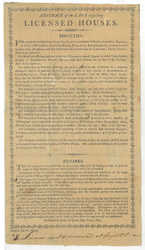The Drunkard's Looking Glass, ca. 1812
Collections of the Dyer Library / Saco Museum
Reverend Mason Locke Weems (1759-1825), best known for his imaginative biography of George Washington, entered the temperance fray with this book, which became popular throughout the United States.
Permit for Nathaniel Deering of Portland to sell liquor, 4 February 1788
Collections of Maine Historical Society
Coll. 951, vol. 14
Public drinking establishments were regulated in Maine as early as 1636 when tavern keepers were held accountable for allowing anyone to become drunk in their establishments. Men and women with solid reputations were granted licenses to run taverns, but as populations grew this social control weakened.

Drawings from Ammi Quint account book, Parsonsfield, 1803
Maine Historical Society
Account Book of Ammi Quint, ca. 1803-1831
Watercolor
Collections of Maine Historical Society
This watercolor shows nearly every type of vessel involved in the Caribbean rum trade prior to Maine statehood.
Abstract of the Laws Respecting Licensed Houses,
Lincoln County, May 1803
Collections of Maine Historical Society
Broadside 281
This remarkable broadside shows that attempts at social control harkening back to the Puritans continued in very specific ways. In spite of prohibitions against dancing, cards, billiards, etc., increased leisure time and prosperity heightened the demand for such entertainments and pastimes.
Log of Privateer Dart , August 31, 1812
Collections of Maine Historical Society
Coll. 949, Ser. 1, vol. 29
During the War of 1812, the Privateer Schooner Dart was launched from the Cape Elizabeth shore of Portland harbor. The log entry of August 31, 1812 records her most famous capture, the brig Dianna loaded with 212 puncheons of rum. Her cargo, sold locally as "Old Dart Rum",brought high prices and, in the estimate of historian William Goold, raised the spirits of all Portland.
A Moral and Physical Thermometer
From An Inquiry into the Effects of Ardent Spirits on the Human Mind and Body,
Boston, 1790
Dr. Benjamin Rush (1745/6-1813) of Philadelphia wrote his influential study, An Inquiry into the Effects of Ardent Spirits on the Human Mind and Body in 1784. As a physician of some stature, he influenced a new generation of medical leaders. In his 1790 edition, he used this chart to illustrate the addictive nature of alcohol.





